Alexey Krivenkov: “My friends sold me a Mail.ru domain for $ 500”

Alexey Krivenkov was at the forefront of DataArt and Mail.ru, but in 2001 left the company. In an interview with DataArt, Alexey talked about when and how the name of the company was invented, the first offices in St. Petersburg and New York, and much more.
Interview: Tanya Andrianova and Daniel Lurie.
Photos from the personal archives of Alexei Krivenkov, Dmitry Andrianov and Andrei Yazikov.
- Who were you before DataArt and how did you end up in the company?
- In general, the name DataArt appeared with me when I was in New York.
I was in the 2nd year of the physics department, and at some point I decided to go to America and visit my friend Dima Kryukov. He drove me to visit his friend’s classmate, Gena Goland, which is how we met.
Two years after this meeting, I decided that I did not want to study at the physics department anymore, but I wanted to go to America to wash cars.
At that time in St. Petersburg I worked in the first Internet providers: in Nevalka, Dux, and then in Web Plaza. I went to visit customers and connected them to the Internet. The Internet then consisted of UUPC email. I probably set up about a hundred UUPC. I connected to the Internet, for example, the famous musician Lesha Vishnyu and the late writer and Internet writer Alexander Zhitinsky.
In general, I was sitting in the rector’s wing in the basement of the University. We had real IP Internet there on 386 Linux, and of course I had a personal e-mail with which I wrote to Gena Golanda that I was going to America. Eugene said that he just has a job for me. I bought a ticket and arrived.
For six months I lived with Zhenya, we collected and sold computers. And then the name DataArt was invented - the name of the company, which will not collect computers, but should write software and provide consulting services. At first, I also had to consult and write software. Then our main business also consisted in connecting customers to the Internet and providing them with e-mail. This is what fascinated me.
In general, I didn’t have time to wash the cars like that ...
- Was it in 1996? What's next?
- And then we got an office on Park Avenue. But at some point I ended my tour, and I had to leave America. I left, spent two weeks in St. Petersburg, and on the way back the Americans told me that it seems to them that all the time that I spent not so long ago in the USA, I worked there illegally. They searched my backpack and found a pass to the “475 Park Avenue” building with the DataArt logo, corporate business cards with the same logo and my name, credit cards that Zhenya made for me to live comfortably and well in America. In general, they decided that I worked illegally in America, and sent me home on the same plane.
“Well, then the Americans forgave you and started giving you visas again?”
- In fact, they did not forgive me. They give me tourist visas, but every time I have to get a special permit.
I flew away, but our clients haven’t gone anywhere. They needed to help with online stores, mail systems, router connections of offices to the Internet. At this moment, I again turn to Zhenya and tell him: “Eugene, this is the story - from riches to mud. What should I do? I dont know". Zhenya tells me: “Don’t worry! You can continue to do from St. Petersburg all the same that he did in America. " It was such a relief for me!
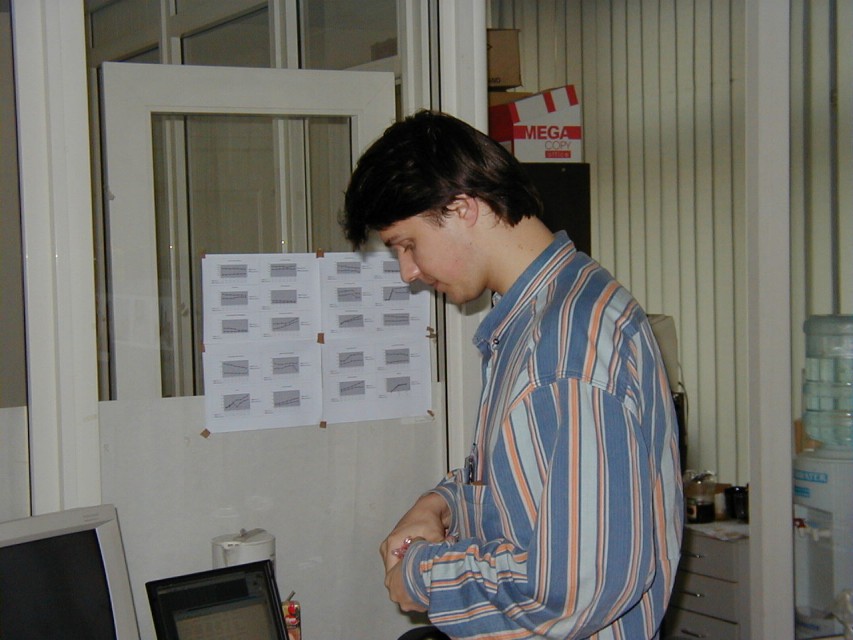
Alexey Krivenkov - August 1999
- That is, became the first offshore employee of DataArt?
- Yes. I quickly found out that such a provider, Web Place, was opened in St. Petersburg, which was organized by my friends. And I got there right away to work as a night support duty. It was very convenient because they had fast internet. Probably a megabit for the entire office - and, possibly, for clients too. And at night, when America was day, I helped customers by telephone and at the same time continued to set up and configure networks with the hands of New Yorkers, how I could write online stores on Perl and help with everything else.
At some point in DataArt, a client came to Wife who needed to write on Access. Then I remembered that I have many classmates who studied with me at the 30th school (one of the best mathematical schools in the city and in the country - ed.), And potential classmates from LITMO - I went to Parfyonov (Vladimir Parfyonov - Dean of the Faculty of Information Technology and ITMO Programming, creator of perhaps the best system for training programmers in Russia - ed.), But did not go. And among my friends, comrades, people immediately began to appear who were able to quickly solve the problems that arise in the Goland in New York. These are Anton Lukht, Petya Lisovin, Ilya Feigin and other guys.
At first I found a person who knew how to write on Access, and he began to work for a New York client. Then came the Telmar client, who needed to write something in Java. And I found my classmate who wrote in Java.
- Has Java already been distributed? What year is this?
- Yes, Java was. This is 97 years old.
Then, working at the same Web Place at night, we advertised in the St. Petersburg Times, an expat newspaper that recently died, looking for successful English-speaking programmers reading the St. Petersburg Times. This ad was answered by a beautiful boy, who also studied at the University at the math. His name was Alexey Miller. And there are already two of us. I believe that at that moment the Petersburg office of DataArt appeared.
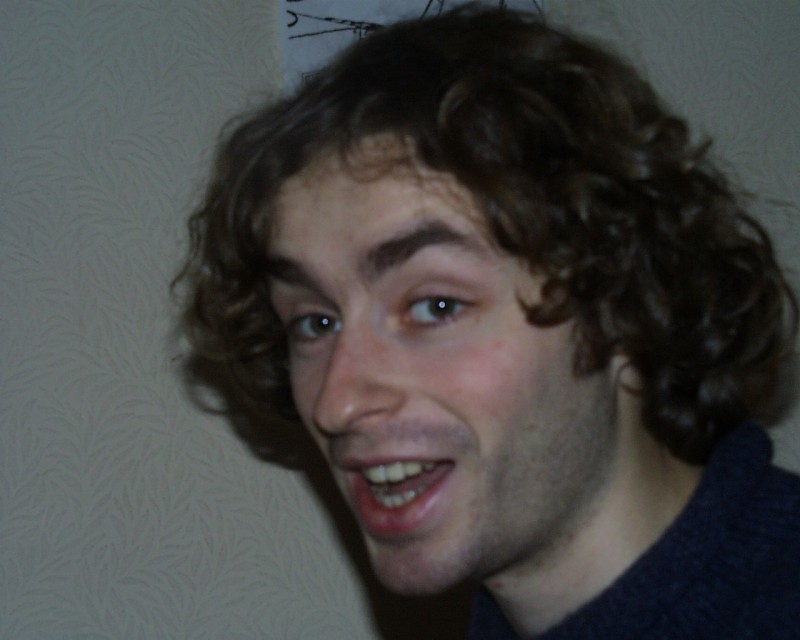
Alexey Miller - 1999.
Misha Zavileisky worked at Web Place, where I continued to work as a night support. He seemed to be engaged in some sort of billing. At the same time, in addition to this work, Zav had a team from Filimonov, Dax (Alexander Makeenkov) and Anton Belov, who, sitting in LITMO, did a startup called “Marketplace”. It was something about the Internet and about the market. E-commerce startup, in short.
And at that moment Zhenya tells me: “Lesha, we need to expand more. A good idea is to look for developers in St. Petersburg and sell them to American customers. ” So an offshore business appeared.
Eugene flew to St. Petersburg, met Zav and his team and decided that this was a great way to expand the company.
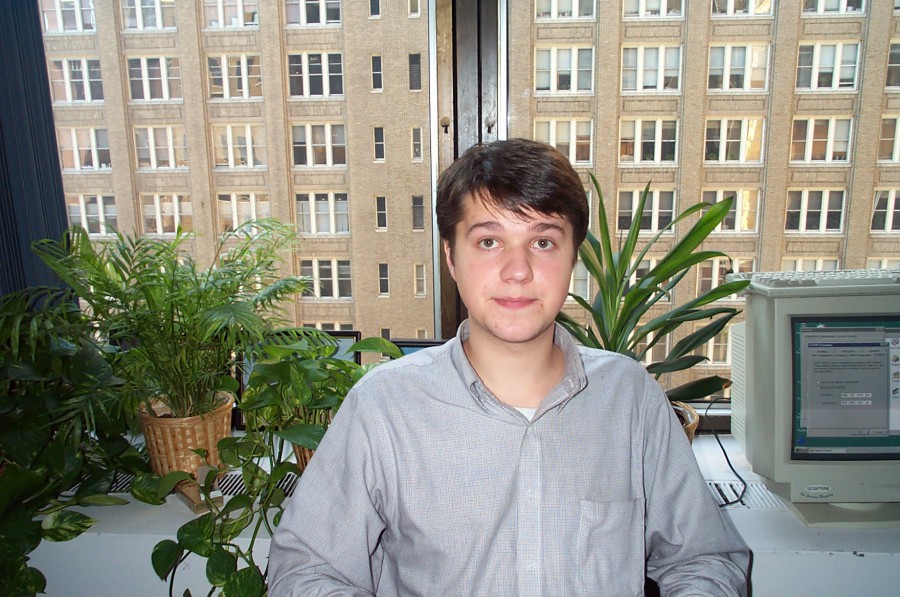
Alexey Krivenkov. Moscow - 1999
- And you continued to work at Web Place?
“By that time, they had kicked me out of there, and we rented a new office on Millionnaya Street.” So a company appeared with offices in two places across the river from each other - at Millionnaya and in LITMO.
Just then, from the developments for our American customers, a prototype of Mail.ru appeared - a service in which people could create their own domains for mail and get POP access to these domains. At the same time with saving cars. This product is called "Multipop". I programmed very poorly, so I called Dima Andrianov, whom I knew from the 30th school. He already worked as a programmer - and indeed was a programming genius. I called him and he came. The company was growing.
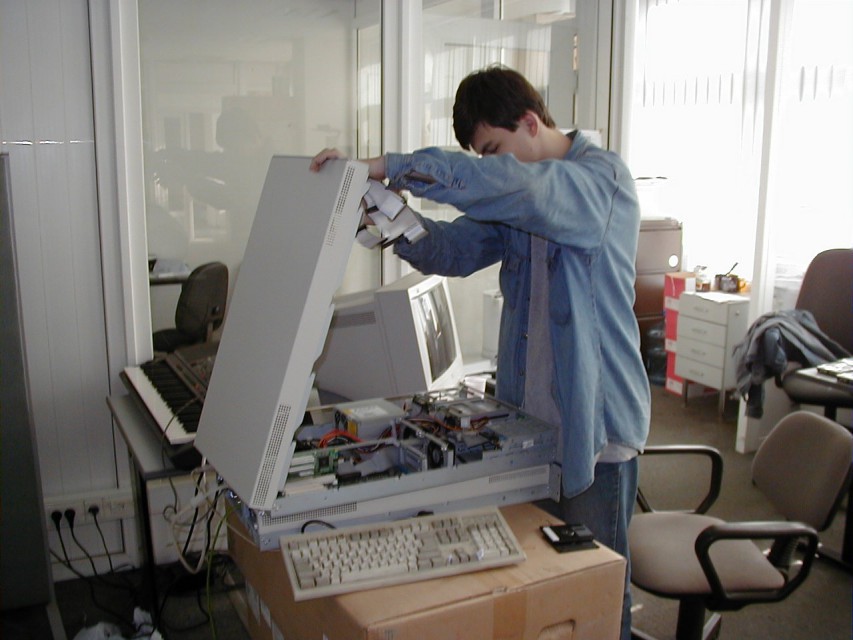
Dmitry Andrianov - 1999.
Then my friends sold me a Mail.ru domain for $ 500. We have deployed Multipopop on this domain. The project began to move, and Zhenya found money in America for Mail.ru to expand and develop. It was the first million dollars that came to the Russian Internet.
And at the same moment Mail.ru began to budge from DataArt. These were 1998–99. Then Mail.ru moved to Moscow, because in LITMO, where the first servers were located, the Internet was over - Mail.ru began to gobble up more than half of the channel from LITMO to Moscow. We moved the server and at about the same time decided that the Mail.ru office would be better and more convenient in Moscow.
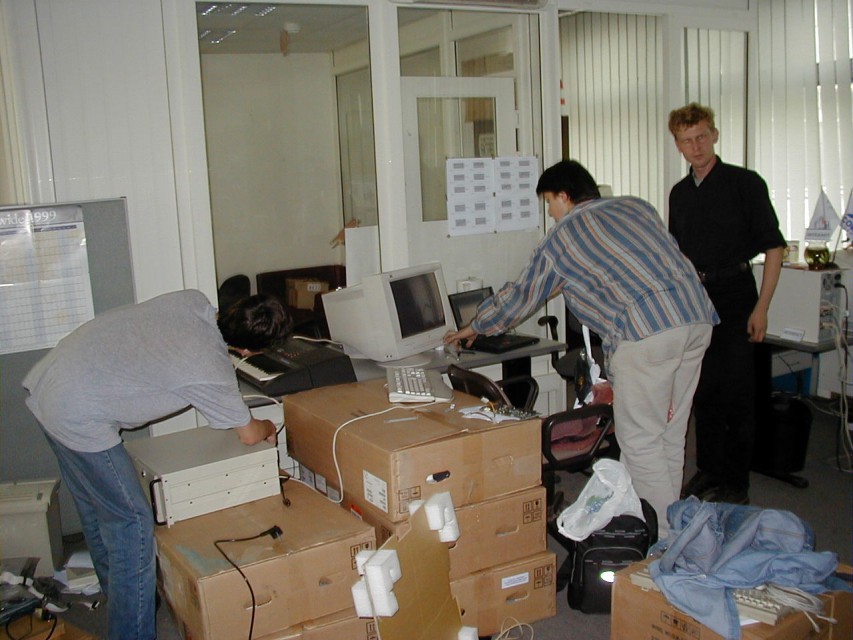
Krivenkov, Andrianov and the Jesters unpack the server. Moscow - 1999
At that moment, DataArt and I became two different companies.
- Now the question is how you ended up in DataArt.
- I also moved to Moscow with a few new Mail.ru employees. We were engaged in Mail.ru, DataArt helped, but we realized that these were two different companies and each should go its own way. And I began to retire from DataArt.
But DataArt remained tightly integrated into Port.ru (the company Mail.ru was named after this to give more portality to the mail service). The development was largely carried out by DataArt employees, content projects and design were also done in St. Petersburg, Danya Dugaev was engaged in Internet.ru, Danya Lurie was in music.ru. Once a week I flew to St. Petersburg to the office at the Moika.
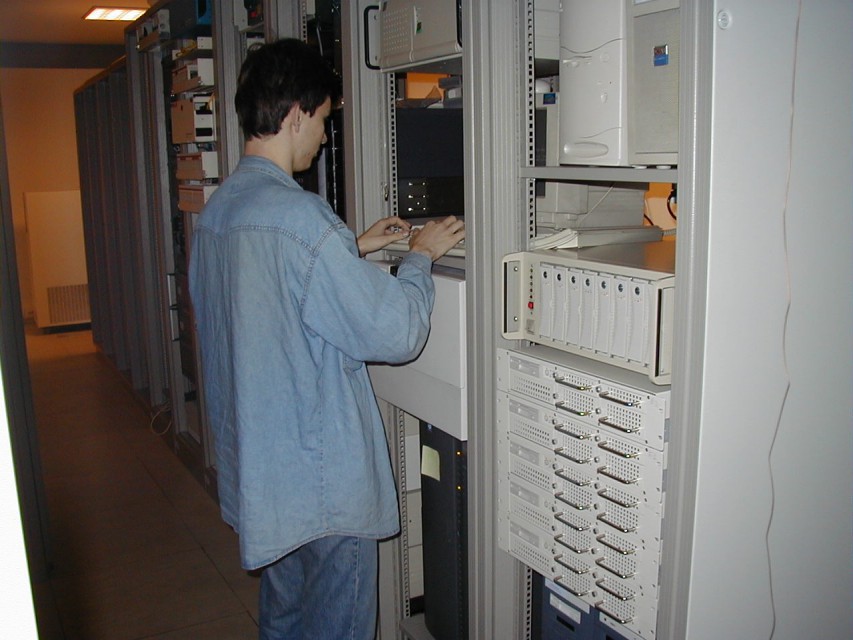
Krivenkov and Mail.ru server - 1999
Eugene Goland continued to lead both companies, and then at some point he decided it was better to take command of Mail.ru, and he fired me. I continued to be a shareholder, spent some time in the polite position of Director of Development. Mail.ru was managed by Zhenya, and I, having worked a little for the sake of decency, as the development director and realizing that we have a different vision of the situation, I realized that I could leave. And since I did not agree with how things were going, I decided to sell my share. I sold it to Yuri Borisovich Milner, now a great Internet investor, for money that was not at all funny at that time: I then had enough money for 10 years.
So Yuri Borisovich began to collect Mail.ru.
“Who was Milner then?”
- He was then at NetBridge and decided that NetBridge needed to merge with Mail.ru. At some point, he took control and bought up all the shares, as I understand it.
In general, after all this, with a decent amount of money for a 23-year-old boy, I spent some time in retirement. I went to Italy, I decided to live there. I was also expelled from there, as well as from America. However, I managed to learn Italian, which is nice, but the Italian history for me ended in three years.
At that time I still had a non-competition agreement with Mail.ru, it was a long one, so I couldn’t deal with the Internet for another 3 to 4 years. Now I understand that I could not give a damn about him or not sign at all, but then it seemed to me important. And I decided to do something that has nothing to do with the Internet. Something that is not for millions of people, but for a few dozen, and not virtual, but real. And I made up a story for myself that I need to make handmade paper with watermarks. I looked at how paper was made in Italy in the Middle Ages, and decided that such a physical startup should be done in Moscow.
This project took about three years. For two years we learned to make paper, another year - to sell it. Neither shaky nor roll, we learned to pay for ourselves. It became clear that we would not make money on this, but Paperman.ru lasted another 10 years. She died literally in the last new year. I sold it to managers, and they did everything very cool. I now think that something successful would come out of this if sold in America.
“You still had a lot of small businesses?”
- Yes, I was engaged in currency exchange, not very successful investments in creating spherical panoramas, and after that I devoted my time to the music business. And he had a hand in the crazy growth of one of the biggest, um, music sites. I will not say his name, because it can still be blamed on me.
Then, already in the new company, we made a bunch of cool television and video sites: Zombobox, Moskva.fm, Piter.fm.
- Was there also a service that considered advertising?
- Yes, Admonitor. In general, we did different things related to the recognition of sound and video images. We did this much earlier than Shazam, but, as usual, epically everyone pissed off in terms of marketing and sales. There was such a service Tunatic, recognizing the sound of a song. Some Frenchman made it. At first I thought to buy this service, and then I quickly found a person in Belgorod who wrote the same thing. We started Moscow.fm on its algorithms, then with a dude from Israel we rewrote Moscow under its algorithms - it was faster and more convenient.
- Then there were the elections?
- Yes, then, in 2012, the story came down to us about Putin’s election and the fact that cameras must be installed in all areas. Three months before the elections, in December, we got the audacity and said that we would create a system that would broadcast video and show it to five million Russians from one hundred thousand sites across the country, from two hundred thousand cameras.
- Like in the series “Silicon Valley”?
- Maybe. We told all employees that we are buying at double price their tickets and hotels booked for the New Year, and that no one is going anywhere, and we are making the system. We were helped by our customers, who were even more afraid of ours that everything would fail. And we did it. On that single day, for which so much government money was spent, the system worked perfectly. On one hundred thousand laptops with Linux and two USB cameras, there was our software, which allowed them to be configured, tied to sections, named cameras, to register all meta-information, send all this information to us in the data center using very different quality channels and broadcast from there to a bunch of people. We were terribly lucky because this whole thing worked for a day and did not break. So this is also a matter of pride.
Since then, we continue to engage in such broadcasts. We make broadcasts of elections for Rostelecom and for Rosobrnadzor broadcast examinations for the exam. Recently, for example, a whole class of children in Mordovia was set on fire during the passing of the exam in chemistry. The last warden leaves the classroom, and the children, forgetting about the cameras, take their phones out of their bras, underpants and pants, take pictures of their examination papers and frantically send them to someone. After 40 minutes, the same video stream shows that teachers are returning and saying: “Guys, the whole country was looking at you, come back in a year, your exam has been canceled, the resistance is useless, turn in your notes.”
It seems to me that this is a good and useful thing, because for children who honestly pass the exam, this thing helps them to enter higher education institutions more likely than children who write off, cheat or conspire with host examiners. This is especially true in Ingushetia and Chechnya.
- Are there cameras everywhere too?
- Yes. And it really helps. Moreover, a Chechen was specially taken to Rosobrnadzor (Anzor Akhmedovich Muzayev, deputy head of the Federal Service for Supervision in Education and Science - ed.), Who helped to ensure that the whole system worked for them there. The students are monitored by distributed volunteer observers, note suspicious moments, escalate it to senior observers and they decide whether to intervene and stop the exam, or check the child for some cribs.
“Are you still there?”
- Yes. In December, we sold this company to Rostelecom. It’s called Restrim, and I’m working in it now.
We still sometimes work with DataArt on new projects. A team from Voronezh worked on part of our mega-super platform for interactive cloud television, we ordered the DA developers from St. Petersburg to develop a prototype of mobile geolocation, convenient controls for iPhone for Moscow.FM. In the round-the-clock race with pre-election broadcasts, admins (Grisha Burmistrov and co) helped us a lot.
- Do you think that DataArt gave you?
- DataArt gave me everything that I can be proud of in this life. If fate hadn’t ordered me that way, if Zhenya Goland hadn’t been so open and trusted me once, then I would have been a different person, I would have been engaged in other matters, and I absolutely can not imagine what would happen to my life.
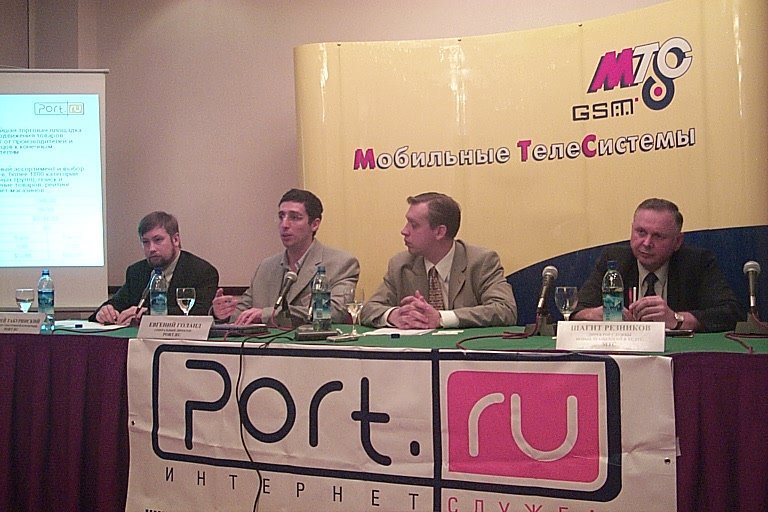
Eugene Goland at an unknown press conference
- With Zhenya, do you still communicate, despite the dismissal?
- Yes, we communicate, and I consider Zhenya the wisest person. Immediately after the breakup, we did not talk to him or talk for five years. I then held some grudges against him, but now everything has changed. I still believe that he is one of the wisest and most generous people of those with whom I am familiar in this life. I think that he determined everything that happened to me.
At the same time, thanks to all this coincidence of events, I took part in the fate of a large number of people who now work in DataArt. I hired Zav, Miller, Dimas, Julia Zhukova (now Zavileyskaya), Tanya Mazurenko (now Andrianova), I met Vika Vinogradova (now Miller) through mutual friends in Moscow.
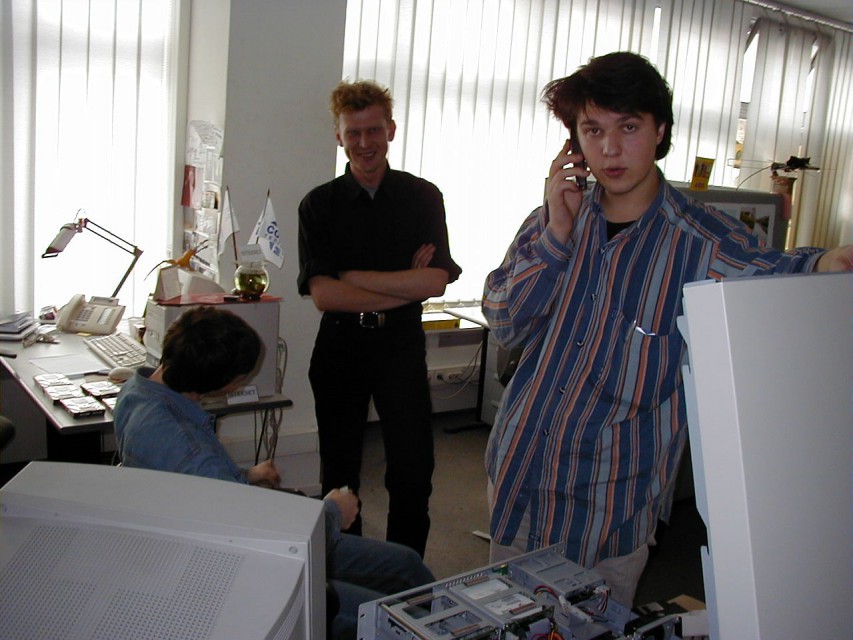
Krivenkov, Andrianov and the Jesters. Moscow - 1999.
